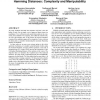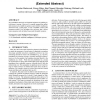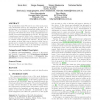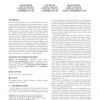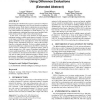82
Voted
ATAL
2015
Springer
9 years 9 months ago
2015
Springer
We study multiple referenda and committee elections, when the ballot of each voter is simply a set of approved binary issues (or candidates). Two well-known rules under this model...
64
Voted
ATAL
2015
Springer
9 years 9 months ago
2015
Springer
76
Voted
ATAL
2015
Springer
9 years 9 months ago
2015
Springer
86
Voted
ATAL
2015
Springer
9 years 9 months ago
2015
Springer
Motivated by allocation and pricing problems faced by service requesters on modern crowdsourcing platforms, we study a multi-armed bandit (MAB) problem with several realworld feat...
53
Voted
ATAL
2015
Springer
9 years 9 months ago
2015
Springer
The probabilistic serial (PS) rule is one of the most prominent randomized rules for the assignment problem. It is well-known for its desirable fairness and welfare properties. Ho...
71
Voted
ATAL
2015
Springer
9 years 9 months ago
2015
Springer
We show that without using any domain knowledge, we can predict the final performance of a team of voting agents, at any step towards solving a complex problem. This demo allows ...
ATAL
2015
Springer
9 years 9 months ago
2015
Springer
Coalition formation provides a versatile framework for analyzing cooperative behavior in multi-agent systems. In particular, hedonic coalition formation has gained considerable at...
61
Voted
ATAL
2015
Springer
9 years 9 months ago
2015
Springer
We address the question of how an agent can adapt its behavior to comply with newly adopted norms. This is particularly relevant in the case of open systems where agents may enter...
54
Voted
ATAL
2015
Springer
9 years 9 months ago
2015
Springer
67
Voted
ATAL
2015
Springer
9 years 9 months ago
2015
Springer
The demonstration is showing a mobile application (2-player game), utilizing context-awareness relying on agents. The agents are gathering and processing context-data retrieved fr...
